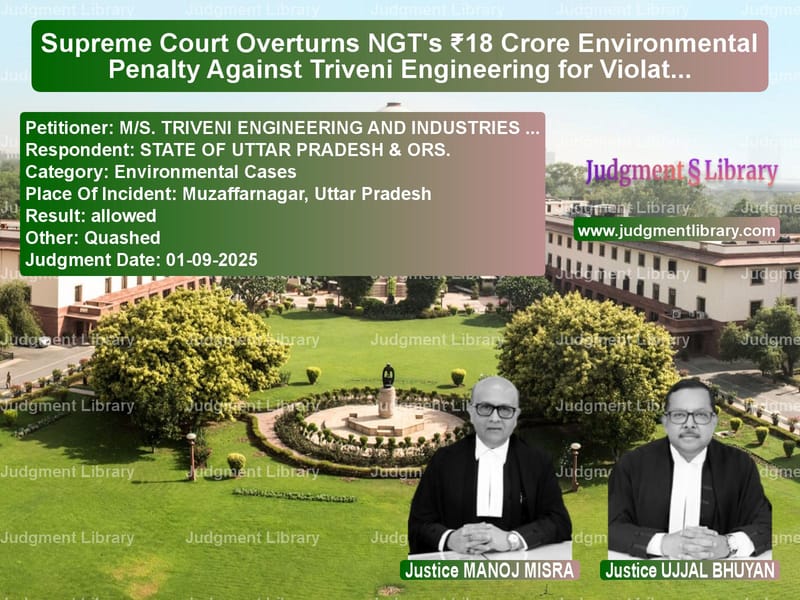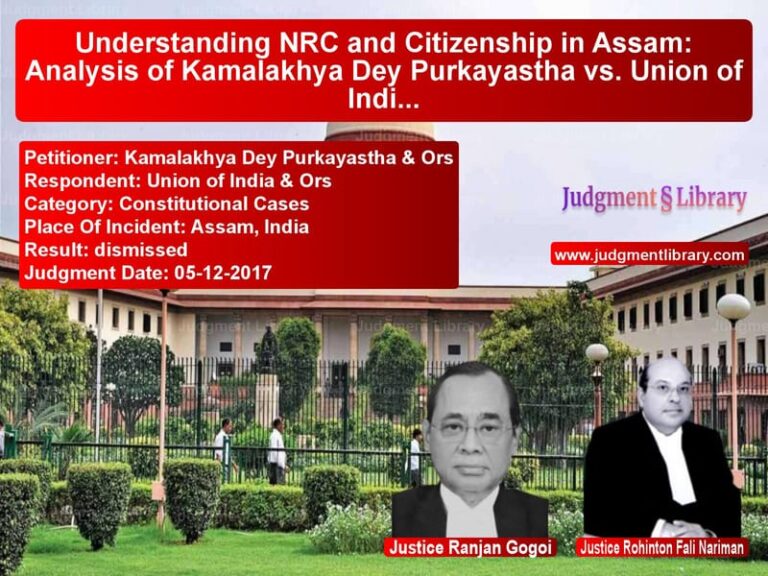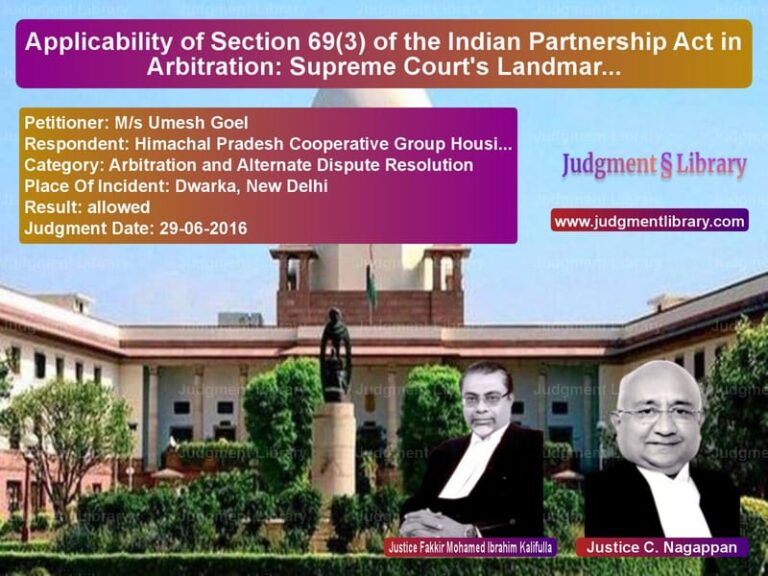Supreme Court Overturns NGT’s ₹18 Crore Environmental Penalty Against Triveni Engineering for Violating Natural Justice
In a significant ruling that reinforces the fundamental importance of procedural fairness in environmental adjudication, the Supreme Court of India has set aside two orders passed by the National Green Tribunal (NGT) that had imposed a hefty environmental compensation of ₹18 crores on M/s. Triveni Engineering and Industries Ltd. The judgment, delivered on September 1, 2025, highlights a critical failure in following established legal procedures and the principles of natural justice.
The case originated from a complaint filed before the NGT alleging that Triveni Engineering’s sugar mill in Muzaffarnagar, Uttar Pradesh, was discharging untreated waste into a drain, contaminating groundwater in the surrounding area. The NGT constituted a joint committee comprising the Central Pollution Control Board (CPCB), Uttar Pradesh Pollution Control Board (UPPCB), and the District Magistrate of Muzaffarnagar to inspect the mill.
Based on the committee’s reports, the NGT passed two orders – one on February 15, 2022, holding that the company had violated environmental norms, and another on September 16, 2022, imposing compensation of ₹18 crores, calculated at 2% of the company’s annual turnover. The amount was directed to be deposited with the District Magistrate for environmental restoration.
The Core Legal Challenge
Triveni Engineering appealed to the Supreme Court, challenging the NGT’s orders on multiple grounds. The company’s senior counsel argued that the orders were “non est in the eye of law” as they were passed in “complete violation of the principles of natural justice.” The appellant contended that despite the entire case being directed against them, they were never made a party to the original proceedings before the NGT.
“NGT failed to appreciate that the appellant was a necessary party and without issuing notice and giving opportunity of hearing to the appellant, no adverse order against the appellant such as the ones dated 15.02.2022 and 16.09.2022 could have been passed,” argued the senior counsel for Triveni Engineering.
The appellant further asserted that “no opportunity of hearing, not to speak of any fair opportunity of hearing, was afforded to the appellant before rendering the findings.” They also questioned the scientific validity of the joint committee’s reports, stating they contained “glaring contradictions” and were “materially different from the readings shown by the data retrieved and recorded by the inspection team.”
Additionally, the appellant challenged the inspection methodology, arguing that the NGT and joint committee had given a “complete go-bye to the procedure laid down under Sections 21 and 22 of the Water (Prevention and Control of Pollution) Act, 1974.”
The State’s Defense
The respondents, represented by the State of Uttar Pradesh and others, supported the NGT’s orders. Their senior counsel argued that without treatment, effluent was being discharged from the sugar mill into a drain, contaminating groundwater in an area where “about 10 to 15 thousand people reside.” They maintained that the “entire population is thus exposed to the polluted water and resultant health hazards.”
The respondents defended the joint committee’s work, stating it had carried out inspection “in a scientific manner” and that the NGT had rightly accepted the reports prepared by “a committee of experts.” They also contended that principles of natural justice “cannot be applied as a straight jacket formula” and noted that the NGT had directed the joint committee to furnish copies of its reports to the project proponent.
The Supreme Court’s Analysis
The Supreme Court bench comprising Justices Manoj Misra and Ujjal Bhuyan conducted a thorough examination of the relevant statutory provisions and case law before delivering its verdict. The Court noted several critical flaws in the NGT’s procedure:
The Court observed that “NGT did not deem it appropriate to get the appellant impleaded as a party respondent in O.A. No. 71/2021 though the entire proceedings were directed against it” and that “no opportunity was granted to the appellant to contest the report of the joint committee and to have its say.”
The judgment particularly emphasized that “environmental compensation was quantified without any adjudication and without granting any opportunity of hearing to the appellant” and was “imposed on the appellant without giving any opportunity to the appellant to contest the reports of the joint committee.”
Principles of Natural Justice
The Court extensively referenced its landmark judgments on natural justice, quoting from A.K. Kraipak Vs. Union of India: “The aim of the rules of natural justice is to secure justice or to put it negatively to prevent miscarriage of justice. These rules can operate only in areas not covered by any law validly made. In other words they do not supplant the law of the land but supplement it.”
Referring to Municipal Corporation of Greater Mumbai Vs. Ankita Sinha, the Court reiterated that “even if NGT intends to initiate suo motu action, it must provide an opportunity of hearing to persons likely to be affected before passing any adverse order against them.”
The judgment also cited State Bank of India Vs. Rajesh Agarwal, where the Court held that “principles of natural justice are not mere legal formalities. They constitute substantive obligations that need to be followed by decision-making and adjudicating authorities.” The Court further emphasized that “every order or proceeding which involves civil consequences or adversely affects a citizen should be in accordance with the principles of natural justice.”
Expert Committees Cannot Replace Adjudication
The Court made an important distinction between expert committees set up by courts/tribunals and those established by the government, noting that “the role of these Expert Committees does not substitute the adjudicatory role of the court or tribunal.”
Quoting from Kantha Vibhag Yuva Koli Samaj Parivartan Trust Vs. State of Gujarat, the Court stated: “The role of an Expert Committee appointed by an adjudicatory forum is only to assist it in the exercise of adjudicatory functions by providing them better data and factual clarity, which is also open to challenge by all the parties concerned. Allowing for objections to be raised and considered makes the process fair and participatory for all the stakeholders.”
The Court also referenced Sanghar Zuber Ismail Vs. Union of India, where it was held that “constitution of an expert committee does not absolve NGT of its duty to adjudicate. The adjudicatory functions of NGT cannot be assigned to committees, even expert committees. The decisions have to be that of NGT.”
Violation of Statutory Procedure
The Court found that the joint committee had completely bypassed the mandatory procedure under Sections 21 and 22 of the Water Act, which prescribe specific protocols for collecting samples, serving notices to occupiers, dividing samples in their presence, and proper sealing and documentation.
The judgment noted that “the joint committee report dated 11.01.2022 as noticed above, is silent as to whether it has followed the procedure laid down in the aforesaid Act more particularly notice to the occupier or his agent and collection and sealing of samples in the presence of the occupier or his agent having his signature on the sealed containers.”
The Final Ruling
In its conclusive findings, the Supreme Court declared: “From the conspectus of facts and law, it is clearly evident that the impugned orders are in complete violation of the procedures laid down in the Water (Prevention and Control of Pollution) Act, 1974, the Environment (Protection) Act, 1986, more particularly Sections 21 and 22 of the Water Act and the National Green Tribunal Act, 2010, including Section 19 thereof. It is crystal clear that the impugned decisions which entail adverse civil consequences upon the appellant were passed without following the due procedure laid down under the statute as well as the elementary principles of natural justice. We, therefore, have no hesitation in declaring such orders to be illegal and null and void.”
The Court made a significant observation about the NGT’s functioning: “NGT exercises judicial functions. Therefore, it is all the more necessary for the NGT to adhere to a fair procedure which is statutorily laid down of which principles of natural justice are an inalienable part.”
In a poignant remark, the Court noted: “As we have noticed above, this is a classic case where in the quest for doing justice, NGT has ended up doing just the reverse.”
While setting aside the NGT’s orders, the Court clarified that “it will always be open to the UPPCB to carry out inspection and take remedial measures qua the sugar mill of the appellant by following the procedure laid down under the Water Act and after complying with the due process statutorily laid down thereunder, including by adhering to the principles of natural justice.”
This judgment serves as a crucial reminder that environmental protection, while of paramount importance, must be pursued through legally sound procedures that respect fundamental principles of justice and fairness. The Supreme Court has reaffirmed that no entity, regardless of the allegations against it, can be penalized without being given a proper opportunity to defend itself.
Petitioner Name: M/S. TRIVENI ENGINEERING AND INDUSTRIES LTD..Respondent Name: STATE OF UTTAR PRADESH & ORS..Judgment By: Justice MANOJ MISRA, Justice UJJAL BHUYAN.Place Of Incident: Muzaffarnagar, Uttar Pradesh.Judgment Date: 01-09-2025.Result: allowed.
Don’t miss out on the full details! Download the complete judgment in PDF format below and gain valuable insights instantly!
Download Judgment: ms.-triveni-enginee-vs-state-of-uttar-prade-supreme-court-of-india-judgment-dated-01-09-2025.pdf
Directly Download Judgment: Directly download this Judgment
See all petitions in Environmental Cases
See all petitions in Legal Malpractice
See all petitions in Other Cases
See all petitions in Judgment by Manoj Misra
See all petitions in Judgment by Ujjal Bhuyan
See all petitions in allowed
See all petitions in Quashed
See all petitions in supreme court of India judgments September 2025
See all petitions in 2025 judgments
See all posts in Environmental Cases Category
See all allowed petitions in Environmental Cases Category
See all Dismissed petitions in Environmental Cases Category
See all partially allowed petitions in Environmental Cases Category







